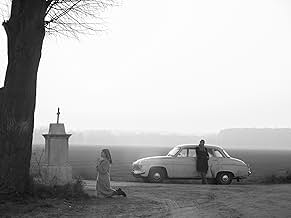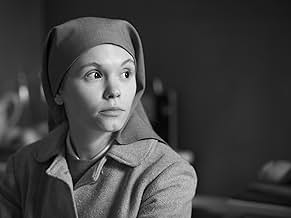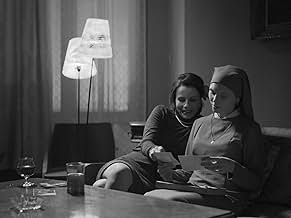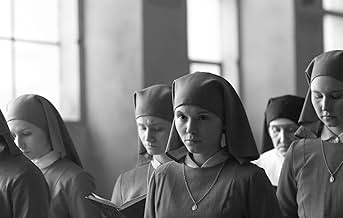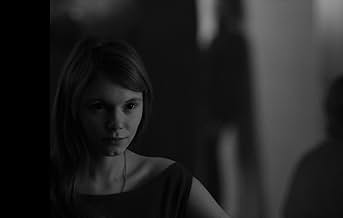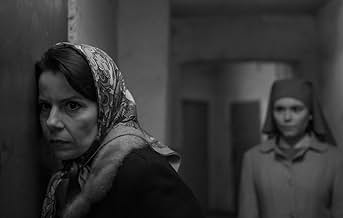IMDb-BEWERTUNG
7,4/10
62.105
IHRE BEWERTUNG
Anna, eine junge Novizin im Polen der 1960er-Jahre, steht kurz vor der Ablegung ihrer Gelübde, als sie ein dunkles Familiengeheimnis aus der Zeit der Nazibesetzung entdeckt.Anna, eine junge Novizin im Polen der 1960er-Jahre, steht kurz vor der Ablegung ihrer Gelübde, als sie ein dunkles Familiengeheimnis aus der Zeit der Nazibesetzung entdeckt.Anna, eine junge Novizin im Polen der 1960er-Jahre, steht kurz vor der Ablegung ihrer Gelübde, als sie ein dunkles Familiengeheimnis aus der Zeit der Nazibesetzung entdeckt.
- Regie
- Drehbuch
- Hauptbesetzung
- 1 Oscar gewonnen
- 70 Gewinne & 92 Nominierungen insgesamt
Natalia Lange
- Bronia
- (as Natalia Lagiewczyk)
Jan Wojciech Poradowski
- Father Andrew
- (as Jan Wociech Poradowski)
Empfohlene Bewertungen
simplicity, great photographs, splendid script. at first sigh, an old fashion movie. in fact, wise manner to use the legacy of impressive tradition and a great director who use, in same measure, with same precision, tension, poetry of images, atmosphere of period, cultural roots. it is a reflection occasion about origins, truth, faith and choices. a profound Polish story who reflects the identity search of an entire continent. it is , certainly, a rare gem. the cause is not only beauty of photography or admirable acting but a special flavor who remains after its end as a delicate feeling. a young woman and the courage to become here self. that is all. in skin of seductive music.
Whereas Jacques Rivette's despairing 'La Religieuse' had been shot in incongruously pretty sixties Eastmancolor, this laconic but wryly good-humoured female road movie - like Ingmar Bergman's Persona' - gains much of it's seductive visual impact from being shot in coolly glacial monochrome that looks like what you'd have got if Vermeer had worked in charcoal.
Similarly, like the Scandinavian good looks of Liv Ullman and Bibi Andersson in Bergman's film, 'Ida' is fascinating to watch throughout simply for the strong Polish features of Agata Kulesza as the chain-smoking 'Red Wanda' and the button eyes of Agata Trzebuchowska in the title role.
Similarly, like the Scandinavian good looks of Liv Ullman and Bibi Andersson in Bergman's film, 'Ida' is fascinating to watch throughout simply for the strong Polish features of Agata Kulesza as the chain-smoking 'Red Wanda' and the button eyes of Agata Trzebuchowska in the title role.
Ida is magnificent, it will stay with me a long time. The narrative is powerfully compelling and yet if it had been a non-narrative film I would have been spellbound by the images alone. They should make a coffee table book of stills from it. Huge emotional issues are dealt with in a remarkably understated, unsentimental, but appropriate way. The use of music (often my pet peeve in these days of Hollywood formula) is enlightened and illustrative. I don't think the ending is ambiguous, I'm not sure the writer who wrote that understood it. Perhaps there is something slightly facile about the way things wrap up in the last 15 minutes of the film, but this is only in comparison with how beautifully they are laid out before that. Enough, this is not really a review, it is an exhortation - Go see Ida!
Ida was a dark somber tragic story expressed perfectly in film.
I am not a big fan of black and white "art" movies done for effect, except the old black and white movies, but Ida was filmed so perfectly, and the stark black and white was so integral to the story and feeling of the movie it was really perfect.
I am not a big fan of jazz either, but again, the choice of Coltrane's jazz music for parts of this film really let you feel what jazz is all about, it was beautiful.
The story was of an orphan nun who is preparing to take her final vows to God. The Mother Superior calls her in and tells her about who she is. Ida grew up not knowing her name or anything about her family. Ida finds that she has an aunt nearby and is told to go to see her before taking her vows.
The slow, heavy and deliberate pace of the movie express the story so perfectly, and there is no pandering or cheap shots, the movie is beautifully done. This is a story that is not for everyone, or every time, but I am glad it was made and that I saw it.
I have to give it a 10/10 for pure craftsmanship and cinematic perfection.
I am not a big fan of black and white "art" movies done for effect, except the old black and white movies, but Ida was filmed so perfectly, and the stark black and white was so integral to the story and feeling of the movie it was really perfect.
I am not a big fan of jazz either, but again, the choice of Coltrane's jazz music for parts of this film really let you feel what jazz is all about, it was beautiful.
The story was of an orphan nun who is preparing to take her final vows to God. The Mother Superior calls her in and tells her about who she is. Ida grew up not knowing her name or anything about her family. Ida finds that she has an aunt nearby and is told to go to see her before taking her vows.
The slow, heavy and deliberate pace of the movie express the story so perfectly, and there is no pandering or cheap shots, the movie is beautifully done. This is a story that is not for everyone, or every time, but I am glad it was made and that I saw it.
I have to give it a 10/10 for pure craftsmanship and cinematic perfection.
This film is recommended.
Anna grew up in a Catholic orphanage, never knowing her parents. Deeply religious, she is slated to become a nun within a few weeks. However, before taking her vows, Anna must leave the convent and visit her only living relative, a cold and distant aunt. Upon their first meeting, she is told that she is really Ida, a Jewish niece. So begins their relationship and journey to find her past and specifically, her parent's unmarked graves.
With an unusually short film length of less than 90 minutes, Ida is an extremely well made film, sensitively directed by Pawel Pawlikowski. Under the backdrop of 1960's Poland, the film's premise of presenting contrasting religions and lifestyles is its main attraction. The screenplay by the director and Rebecca Lenkiewicz has much to say and tells its linear narrative concisely and without any flourish.  Ida is a fine film that could have been a great film had its script added more dimension to its central character. Anna, or Ida, is mainly a saintly conduit, a devout presence who never seems to be real in any sense. She begins as an enigma and, surprisingly, rarely displays any strong emotional reaction when confronted with disturbing news.
Agata Trzebuchowska plays Ida / Anna and she is physically right for the role. The actress invests the right degree of innocence and vulnerability. Even more effective is Agata Kulesza as Ida's bitter and alcoholic Aunt Wanda. Her role has far more depth and the actress makes subtle choices in underplaying the anger and hostility within her complex character. It is a strong and memorable performance.
The film, beautifully photographed by Ryszard Lenczewski and Lukasz Zal, might have a smaller budget than most movies these days, but one never notices any lapse in quality as production values are of the highest caliber. With lovely black & white images and a lyrical score by Kristian Eidnes Andersen, Ida is superior filmmaking, even if some of the transitions and editing seems slightly abrupt. The film effectively deals with powerful themes that will resonate with any serious film-goer and deserves to be seen. GRADE: B
Visit my blog at: www.dearmoviegoer.com
ANY COMMENTS: Please contact me at: jadepietro@rcn.com
Anna grew up in a Catholic orphanage, never knowing her parents. Deeply religious, she is slated to become a nun within a few weeks. However, before taking her vows, Anna must leave the convent and visit her only living relative, a cold and distant aunt. Upon their first meeting, she is told that she is really Ida, a Jewish niece. So begins their relationship and journey to find her past and specifically, her parent's unmarked graves.
With an unusually short film length of less than 90 minutes, Ida is an extremely well made film, sensitively directed by Pawel Pawlikowski. Under the backdrop of 1960's Poland, the film's premise of presenting contrasting religions and lifestyles is its main attraction. The screenplay by the director and Rebecca Lenkiewicz has much to say and tells its linear narrative concisely and without any flourish.  Ida is a fine film that could have been a great film had its script added more dimension to its central character. Anna, or Ida, is mainly a saintly conduit, a devout presence who never seems to be real in any sense. She begins as an enigma and, surprisingly, rarely displays any strong emotional reaction when confronted with disturbing news.
Agata Trzebuchowska plays Ida / Anna and she is physically right for the role. The actress invests the right degree of innocence and vulnerability. Even more effective is Agata Kulesza as Ida's bitter and alcoholic Aunt Wanda. Her role has far more depth and the actress makes subtle choices in underplaying the anger and hostility within her complex character. It is a strong and memorable performance.
The film, beautifully photographed by Ryszard Lenczewski and Lukasz Zal, might have a smaller budget than most movies these days, but one never notices any lapse in quality as production values are of the highest caliber. With lovely black & white images and a lyrical score by Kristian Eidnes Andersen, Ida is superior filmmaking, even if some of the transitions and editing seems slightly abrupt. The film effectively deals with powerful themes that will resonate with any serious film-goer and deserves to be seen. GRADE: B
Visit my blog at: www.dearmoviegoer.com
ANY COMMENTS: Please contact me at: jadepietro@rcn.com
Wusstest du schon
- WissenswertesPawel Pawlikowski had such difficulty finding an actress to play the titular character that he asked his friends to take secret photographs if they saw anyone who was in the right ballpark of the character. One of his friends, director Malgorzata Szumowska, saw Agata Trzebuchowska in a Warsaw café, took the picture and persuaded her to audition. She agreed to meet with Pawlikowski because she was a fan of his film My Summer of Love (2004).
- PatzerWhen Ida is in a church, the priest seems to be getting ready to say Mass and we see a versus populum altar, which didn't become the norm until years later after Vatican II. The movie takes place in 1961 and the priest would have been saying Mass on the high altar.
- VerbindungenFeatured in 72nd Golden Globe Awards (2015)
- SoundtracksSerduszko puka w rytmie cha-cha
Music by Romuald Zylinski
Lyrics by Janusz Odrowaz-Wisniewski
Performed by Maria Koterbska
Top-Auswahl
Melde dich zum Bewerten an und greife auf die Watchlist für personalisierte Empfehlungen zu.
- How long is Ida?Powered by Alexa
Details
Box Office
- Budget
- 1.000.000 $ (geschätzt)
- Bruttoertrag in den USA und Kanada
- 3.827.060 $
- Eröffnungswochenende in den USA und in Kanada
- 55.438 $
- 4. Mai 2014
- Weltweiter Bruttoertrag
- 11.156.836 $
- Laufzeit1 Stunde 22 Minuten
- Farbe
- Sound-Mix
- Seitenverhältnis
- 1.37 : 1
Zu dieser Seite beitragen
Bearbeitung vorschlagen oder fehlenden Inhalt hinzufügen




